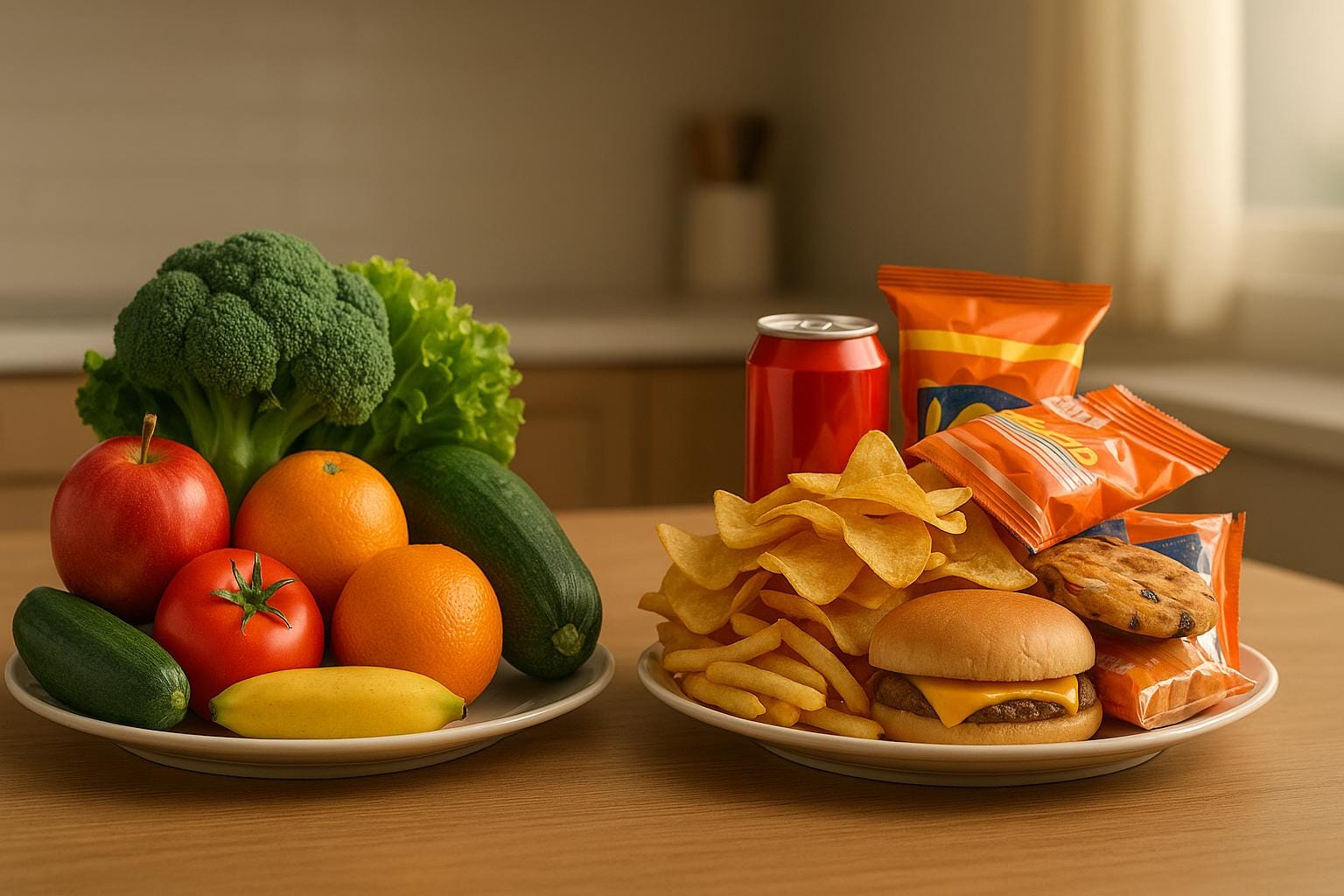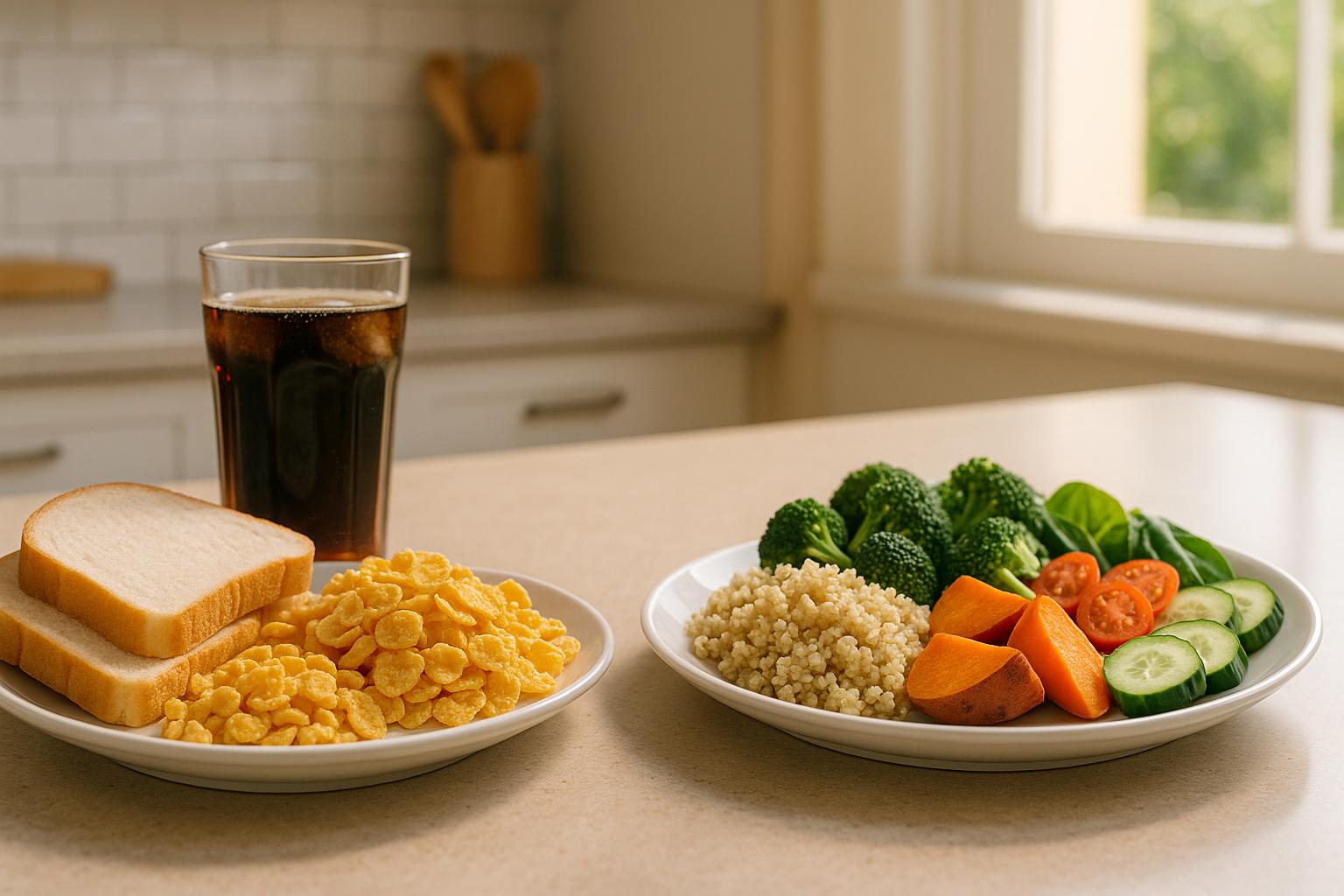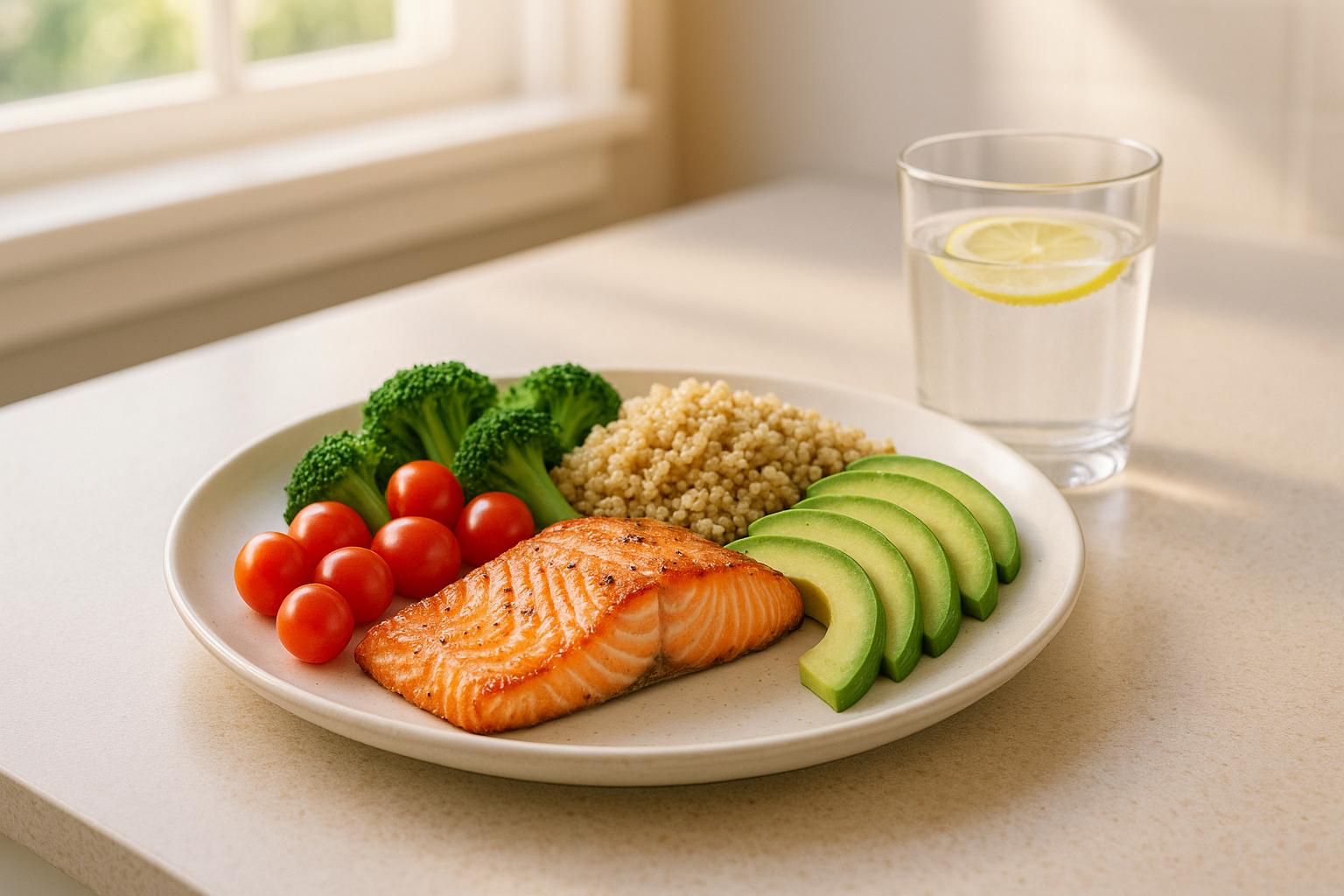Processed foods dominate modern diets, but their convenience comes at a cost: your health and lifespan. Here’s the bottom line:
- Ultra-processed foods make up nearly 60% of American calorie intake. For children, it’s even higher at 67%.
- Regular consumption is linked to faster biological aging, chronic diseases like heart disease and diabetes, and a 10% higher mortality risk.
- These foods are packed with added sugars, unhealthy fats, and artificial additives, while lacking essential nutrients like fiber, vitamins, and minerals.
The more ultra-processed foods you eat, the greater the risk. Studies show even a 10% increase in consumption raises cardiovascular risks by over 10% and all-cause mortality by 18%.
What’s the solution? Start small: swap processed snacks for whole fruits, cook meals at home, and choose minimally processed options like whole grains and fresh produce. Each healthier choice adds up to a longer, better-quality life.
Every bite of ultraprocessed food will increase your chance of an early death, major new study says
How Processed Foods Impact Longevity
Ultra-processed foods are taking a toll on American health and lifespan. With these foods making up as much as 70% of the average U.S. diet, their effects on public health are undeniable. Research has consistently shown a direct connection between high consumption of ultra-processed foods and a shorter lifespan. Let’s explore how these foods impact health and the biological processes behind their effects.
Health Risks of High Processed Food Intake
One of the biggest dangers linked to ultra-processed foods is their impact on heart health. Studies reveal that people who consume the most of these foods face a 17% higher risk of cardiovascular disease, a 23% greater chance of coronary heart disease, and a 9% increased likelihood of stroke. Even a modest 10% increase in ultra-processed food intake raises cardiovascular risks by over 10%. Adding just one more serving a day increases the risk of death from all causes by 18%, while also contributing an extra 500 calories daily - fueling obesity and compounding cardiovascular risks.
"There's a lot of overlap between ultra-processed foods and those that are high in saturated fat, added sugar, and sodium, which are already known contributors to heart disease."
- Alison Brown, Ph.D., RDN, National Heart, Lung, and Blood Institute
A large-scale study further highlighted the danger, showing a 31% higher mortality rate among those who consumed the most ultra-processed foods compared to those who ate the least. The mechanisms behind these risks include chronic inflammation, disruptions in the immune system, and changes to the gut microbiome. These foods have also been linked to weight gain, high blood pressure, type 2 diabetes, and other chronic illnesses.
Biological Aging and Processed Foods
Eating ultra-processed foods can also speed up biological aging. Consuming more than 14% of daily calories from these foods has been linked to aging at a cellular level. This means your body may age faster than your actual years, potentially cutting your life short. Key contributors include telomere shortening and oxidative stress, both of which damage cells and impair the function of vital organs. Chronic low-grade inflammation - often triggered by these foods - further weakens the body’s defenses and accelerates aging.
Another alarming factor is the hormonal disruption caused by chemicals in food packaging. Substances like bisphenols and phthalates can leach into foods, interfering with hormone balance and further damaging cellular health. Over time, these effects combine to undermine the body’s resilience and hasten the aging process.
Nutritional Quality and Additives
Ultra-processed foods are notorious for delivering "empty calories." They’re packed with added sugars, refined carbs, trans fats, and artificial ingredients but lack essential nutrients like vitamins, minerals, and antioxidants. These foods also contain additives - such as artificial colors, preservatives, non-caloric sweeteners, and emulsifiers - that have been linked to inflammation, weight gain, and even impaired gut and brain health.
The long-term effects of regularly consuming these additives remain uncertain, but the immediate consequences are clear. When ultra-processed foods make up more than half of daily calories - as they do for 57% of American adults - there’s little room left for nutrient-dense whole foods that support overall health.
"Ultra-processed foods are better at preserving shelf life than human life."
- Dr. Stephen Devries, preventive cardiologist
This nutritional imbalance highlights the importance of shifting toward whole, nutrient-rich foods. Up next, we’ll dive into specific processed food categories to limit or avoid.
This article is for informational purposes only and is not intended as medical advice. Please consult a healthcare professional before starting any new fitness or wellness routine.
Common Processed Foods to Avoid for Longer Life
The link between ultra-processed foods and aging is well-documented, with certain types of processed foods standing out as particularly harmful. Research has pinpointed specific categories of these foods that significantly affect longevity, making them important to limit or avoid.
High-Risk Food Categories
Processed meats are among the most concerning. The World Health Organization (WHO) has classified them as carcinogenic after reviewing more than 800 studies. These studies found the strongest connections to colorectal cancer, followed by stomach cancer. Unlike fresh meat, processed meats contain harmful chemicals that can increase health risks. Consuming as little as 5 ounces of processed meat per week has been linked to a higher risk of heart disease. A large study involving nearly 541,000 Americans identified processed meats as one of the food groups most strongly associated with higher mortality rates.
Sugar-sweetened and artificially sweetened beverages are another major concern. These drinks are often loaded with calories but offer little to no nutritional value, contributing to excessive calorie intake without providing essential nutrients. Alarmingly, ultra-processed foods account for about 90% of the added sugars in the average American diet. Studies have consistently linked these beverages to higher all-cause mortality rates.
Ultra-processed breakfast items, including sugary cereals and pastries, pose yet another risk. Starting the day with these foods can lead to blood sugar spikes and crashes, creating a cycle of energy highs and lows throughout the day. Over time, this pattern can contribute to an increased risk of mortality.
Dairy-based desserts, such as ice cream and flavored yogurts, also fall into the high-risk category. These products often combine high levels of sugar, excessive calories, and artificial additives, which have been associated with increased all-cause mortality in research studies.
Together, these food categories contribute to a measurable rise in mortality risks. High consumers of ultra-processed foods face a 4% higher risk of all-cause mortality and an 8% higher risk of neurodegenerative disease-related mortality compared to those who consume the least. A long-term study involving over 500,000 participants found that eating more ultra-processed foods could shorten lifespans by more than 10%. When adjusted for gender, the risk increased to 15% for men and 14% for women.
"If people maintain a generally healthy diet, I don't think they need to be scared." - Mingyang Song, associate professor of clinical epidemiology and nutrition
The broader impact of ultra-processed food consumption is staggering. Since the mid-1990s, consumption of these foods has likely doubled, and they now make up nearly 60% of the average American's daily calorie intake. In fact, as much as 70% of food in grocery stores is considered ultra-processed. These foods are particularly harmful due to their combination of high sodium, saturated fat, and added sugars, along with potentially harmful additives.
This article is for informational purposes only and is not intended as medical advice. Please consult a healthcare professional before starting any new fitness or wellness routine.
Processed Foods vs. Whole Foods: A Comparison
When you compare processed foods to whole foods, it’s clear how your dietary choices can influence your health and longevity. The differences go beyond just flavor – it’s about nutrients, additives, and how your body processes these foods at a deeper level. This comparison highlights why preserving nutrient quality is so important for aging well.
Whole foods are packed with nutrients in their natural state. On the other hand, ultra-processed foods, which make up around 60% of the average American's calorie intake, often fall short in nutrient density.
Take calories, for example. A 100-gram serving of potato chips contains 545 calories, while the same amount of a plain baked potato has only 95 calories. Processing not only increases calorie content but also strips away essential nutrients.
"The issue is not food, nor nutrients, so much as processing."
- Monteiro CA
Ultra-processed foods are typically low in fiber, protein, vitamins, and minerals but high in salt and unhealthy fats. Fiber, in particular, plays a vital role in digestive health, stabilizing blood sugar, and supporting gut bacteria, all of which contribute to healthier aging.
These foods also contain artificial additives like colors, flavors, and preservatives, which can lead to inflammation and cellular damage. Additionally, they account for nearly 90% of the added sugars in the American diet, whereas whole foods naturally have little to none. This stark difference affects blood sugar levels and overall metabolic health.
Here’s a quick breakdown of how whole and processed foods stack up:
Comparison Table: Processed vs. Whole Foods
| Aspect | Whole Foods | Processed Foods |
|---|---|---|
| Nutrient Density | High in essential nutrients per calorie | Often lower in vitamins and minerals |
| Fiber Content | Rich in natural fiber | Commonly lower in fiber |
| Added Sugars | Little to no added sugars | High in added sugars |
| Additives | Minimal to no artificial additives | Contains artificial colors, flavors, and preservatives |
| Calorie Density | Lower calories per serving (e.g., baked potato: 95 calories/100g) | Higher calories per serving (e.g., potato chips: 545 calories/100g) |
| Sodium Content | Naturally low sodium | High in added sodium |
| Processing Level | Largely untouched by artificial processing | Undergoes various modifications |
The nutritional differences between these two food types are hard to ignore. Research shows that diets rich in plant-based whole foods can reduce the risk of chronic diseases by up to 50%. On the flip side, consuming more than 14% of your daily calories from ultra-processed foods has been linked to faster biological aging.
"The intense processing of ultra-processed foods disrupts the natural structure, or matrix, of whole foods."
- Thomas M. Holland, MD, MS, Physician-Scientist and Assistant Professor at the RUSH Institute for Healthy Aging, RUSH University, College of Health Sciences
This disruption hampers the body’s ability to absorb nutrients effectively and may trigger inflammation, speeding up cellular aging. Whole foods, however, retain their natural nutrient structure, allowing for better absorption of vitamins, minerals, and antioxidants.
Switching from whole to processed foods often means losing beneficial compounds and gaining harmful ones. For instance, hydrogenated oils in processed foods can promote inflammation and accelerate cellular damage. In contrast, whole foods are rich in antioxidants, which help protect against chronic diseases linked to aging.
This article is for informational purposes only and is not intended as medical advice. Please consult a healthcare professional before starting any new fitness or wellness routine.
How to Reduce Processed Food Intake
Cutting back on processed foods and embracing whole foods is easier than you might think. By making small, intentional changes, you can build healthier eating habits that benefit your overall well-being. Let’s explore some practical tips to help you identify processed foods, make smart substitutions, and stick to lasting dietary changes.
How to Identify Ultra-Processed Foods
Ultra-processed foods are often the result of multiple industrial processes and include ingredients you wouldn’t typically find in a home kitchen. To spot these items, check the ingredient list for things like artificial flavors, flavor enhancers, synthetic sweeteners, colors, or emulsifiers. These additives are designed to make products more appealing, not necessarily healthier.
Professor Alyson Mitchell from UC Davis sheds light on the purpose of these additives:
"The purpose is not necessarily to improve safety or improve the shelf life of the food. It's to sell a food product. It's to make money off the food."
By learning to recognize these ingredients, you can make more informed choices about what you eat.
Healthy Substitutions and Meal Planning
Once you can identify ultra-processed foods, the next step is finding healthier, nutrient-packed alternatives. Whole foods can be both delicious and budget-friendly. For example, whole grains like brown rice and oats often cost less per serving than processed cereals, and a block of cheese is usually cheaper than pre-shredded options.
Here’s how you can make simple swaps throughout your day:
Breakfast:
Ditch sugary cereals for options like wheat biscuit cereal, no-added-sugar muesli, or plain oatmeal. Instead of a croissant, try plain natural yogurt topped with fresh fruit for a satisfying start to your day.
Lunch and Snacks:
Trade sugary snack bars for a slice of malt loaf or a fruited teacake. For a crunchy snack, go for plain popcorn, rice cakes, or a handful of raisins instead of potato chips. When it comes to drinks, water infused with berries or chopped fruit is a refreshing alternative to soda or juice pouches.
Dinner:
Opt for low-fat ground meat instead of processed sausages in dishes like spaghetti bolognese. Cooking at home is another great way to cut down on processed ingredients - make your own pizza and season it with herbs and spices rather than relying on salt or soy sauce.
Smart shopping can also make a big difference. Frozen fruits and vegetables are just as nutritious as fresh ones, more affordable, and available year-round. Cheaper cuts of meat work well in soups, stews, and casseroles, and you can replace processed meats with options like chicken, salmon, turkey, beans, lentils, tofu, or tempeh.
Meal planning is key to staying on track. By planning your meals ahead of time, you can control both ingredients and portion sizes, reducing the temptation to grab processed convenience foods.
Making Changes That Last
Small, steady changes can lead to long-term success. Start by improving the nutritional quality of just one meal a day. Once that becomes routine, expand those healthier choices to other meals. The goal isn’t to cut out all processed foods but to focus on whole, minimally processed options whenever possible.
Traditional diets often feature a mix of unprocessed or minimally processed plant foods, prepared and seasoned with simple ingredients. By prioritizing these types of meals, you can create a sustainable approach to eating that supports your overall health.
This article is for informational purposes only and is not intended as medical advice. Please consult a healthcare professional before starting any new fitness or wellness routine.
Conclusion
Processed foods take a toll on both lifespan and aging. Studies reveal that people who eat large amounts of ultra-processed foods are 10% more likely to face earlier mortality during long-term follow-ups, especially from conditions like heart disease and diabetes. For every 10% increase in ultra-processed food consumption, the gap between biological and chronological age widens by 2.4 months.
The impact goes beyond poor nutrition. These foods are linked to over 30 negative health outcomes and accelerate biological aging when they account for more than 14% of daily calories. This creates a harmful cycle, eroding health and vitality over time.
Even small changes can lead to meaningful improvements. As Dr. Barbara Cardoso from Monash University notes:
"Reducing ultra-processed foods in the diet may help slow the biological ageing trajectory, bringing another reason to target ultra-processed foods when considering strategies to promote healthy ageing".
You don’t need to overhaul your diet overnight. Start with small steps - like replacing one processed meal with a whole-food alternative. Each small shift adds up, reducing harm and laying the groundwork for a healthier, longer life. The choices you make today can improve your well-being now and extend your years ahead.
This article is for informational purposes only and is not intended as medical advice. Please consult a healthcare professional before starting any new fitness or wellness routine.
FAQs
How can I spot ultra-processed foods in my diet?
To identify ultra-processed foods, take a close look at the ingredient labels. Watch out for additives such as preservatives, artificial sweeteners (like aspartame or sucralose), artificial flavors, and colorings. These are often telltale signs of heavily processed items. Additionally, these foods typically contain high amounts of added sugar, salt, and saturated fats and often bear little resemblance to their natural or original state.
Common examples include packaged snacks, sugary cereals, instant noodles, and soft drinks. Choosing whole or minimally processed options - like fresh fruits, vegetables, lean proteins, and whole grains - can help you cut back on ultra-processed foods and support better health in the long run.
What are some simple ways to eat less processed food?
Reducing your consumption of processed foods can be simpler than you think. Keep fresh, whole foods like fruits, vegetables, and nuts within reach for quick and nutritious snacks. Swap out refined grains for whole-grain options, such as whole-wheat bread or brown rice, to make healthier choices.
Cooking at home is another effective way to take charge of what goes into your meals. When you're grocery shopping, take a moment to check nutrition labels - aim for products with less added sugar, sodium, and saturated fat. These small, everyday adjustments can go a long way in supporting a healthier lifestyle and boosting your overall well-being.
What health issues are most closely linked to eating ultra-processed foods?
Ultra-processed foods have been closely associated with a range of health problems, including obesity, type 2 diabetes, heart disease, high blood pressure, and even some cancers. Beyond physical health, these foods can also take a toll on mental well-being, potentially contributing to conditions like depression and anxiety. Additionally, they may heighten the risk of poor cardiometabolic health.
What makes them so harmful? These foods are typically loaded with added sugars, unhealthy fats, and excessive sodium, while offering very little in terms of essential nutrients. Over time, regular consumption can trigger chronic inflammation and other issues that speed up aging and affect overall longevity. Shifting away from ultra-processed options and prioritizing whole, nutrient-dense foods can make a noticeable difference in both immediate and long-term health outcomes.












